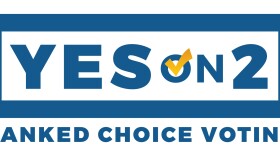Question 2 on this November’s ballot in Massachusetts asks voters if they want to adopt a ranked choice voting system in time for the 2022 elections. Earlier this week, we brought you an interview with a supporter of ranked choice voting. The No On 2 committee is opposed to the move, saying that with races for governor, Congress and the state house, too much is at stake for a new process they define as deeply flawed. WAMC talked with spokesperson Anthony Amore – who unsuccessfully ran for Secretary of State as a Republican against Democrat William Galvin in 2018 – about why he disagrees with advocates who say ranked choice voting would better represent voter wishes.
AMORE: I would say that that's a noble effort, but it's not accomplished through ranked choice voting. Ranked choice voting is an overly, unnecessarily complicated system that actually disenfranchises many voters and leads to a vast increase in the number of ballots that are spoiled, which means are discounted in the election. It also takes away the idea of one person one vote, so that in an election in which the ranked choice process is initiated, some people have multiple votes cast, and some people only have one. So it's not a fair system by any means. It doesn't lend itself to simplicity and ease of understanding, which is key to a valid and fair election. And that's why we're opposed to it.
WAMC: Can you explain your comments about spoiling a ballot? What would that mean?
Sure. A spoiled ballot is about in which a voter is confused by the complicated ballot. And it is complicated. So they incorrectly mark it. For instance, maybe they they choose somebody first, and then they fill in the bubbles for two separate people as second place. For instance, in Minneapolis, they saw an election, a ranked choice election, which 10%- Imagine that. One in every 10 ballots was not counted, because they were spoiled, because there were errors. And that's because the system's so complicated. In Maine, where they have rank choice voting, a 19-page instruction manual was given to voters. Imagine that. I mean, in Massachusetts, we're used to going and getting a ballot and a pen. And imagine now needing 19 pages to understand what you're to do with your ballot.
I imagine some would say that with any change in a system, there's a predictable initial confusion over it. Do you think that sort of problem wouldn't be dealt with naturally just with people getting used to a new system like ranked choice voting?
Well, I'd say a couple of things. First of all, I think elections are far too important to say we need, you know, a few election cycles for people to know what they're doing in the ballot booth. Elections are consequential. People's votes matter. And we shouldn't sacrifice those to try to perfect a system in the long term that might never be perfected. Secondly, you would have t0- To make such a change, you would have to show that the change is worth it. Now, an analysis by the Maine Policy Institute showed that in fact, when they looked at over 90 elections, 61% had elections that resulted in the winner still getting less than 50% of the vote. So it's a change that doesn't necessarily accomplish the lofty goals set forth by the pro-ranked choice voting people.
Advocates for the change say that it would also give voters an opportunity to pull apart from the two party system that some are frustrated with in America. Do you have any thoughts on that argument for ranked choice voting?
I do. It's another thing that's a nice goal, but it is not accomplished by ranked choice voting. There's no instance, in America where ranked choice voting is implemented that we've seen a rise in third parties or third party candidates. When you ask ranked choice voting advocates where they've seen this happen, they point to Australia, which has a different ranked choice voting system than we're looking at here, Papa New Guinea, whose election and government system doesn't mirror ours, and sometimes they'll mention Ireland, which again, has a vastly different tradition, number of parties and governance system than we do. So it doesn't accomplish what they set forth to accomplish. And that's incredibly problematic,
Other than the possibility of spoiled ballots, what do you think is at stake with question two on November's ballot?
I think there's a heck of a lot at stake. You also not only have spoiled ballots, but you have a thing called exhausted ballots. And that is a case in which- Let's suppose there's five people on a ballot, and you only choose one or two because you don't know all of the five candidates. Well, if those two don't make it past the first round, your ballot is what's called exhausted. In other words, you don't have a say in that final showdown. That is just a terrible system that leaves people disenfranchised. Exhausted and spoiled ballots take a lot of people out of the final call in an election- and what's the point of it if we're not getting everybody's voice?







